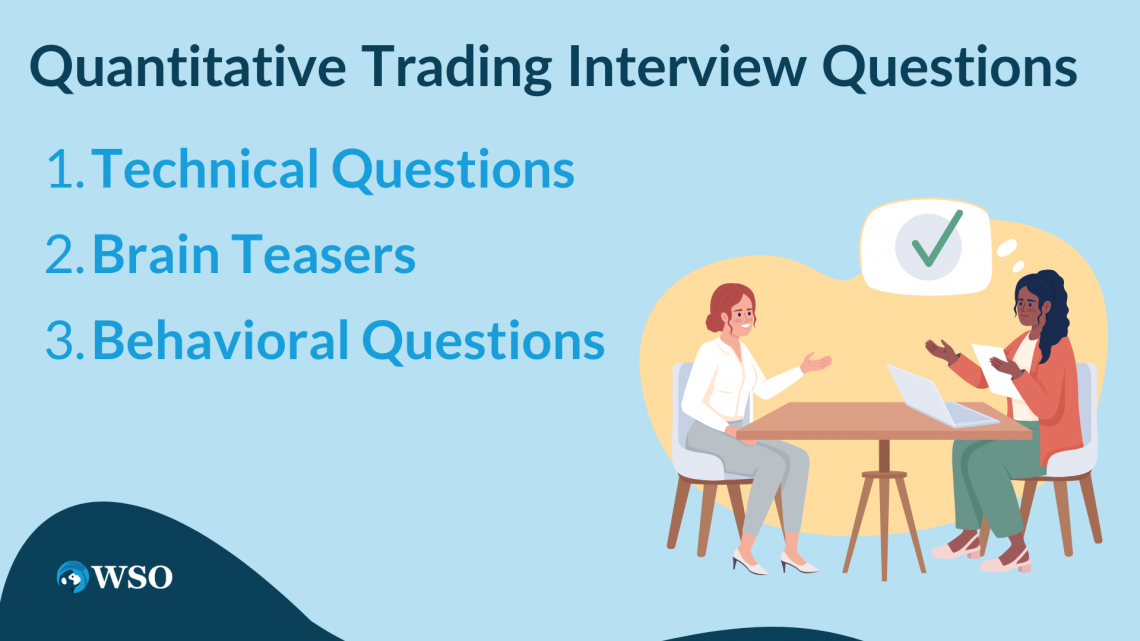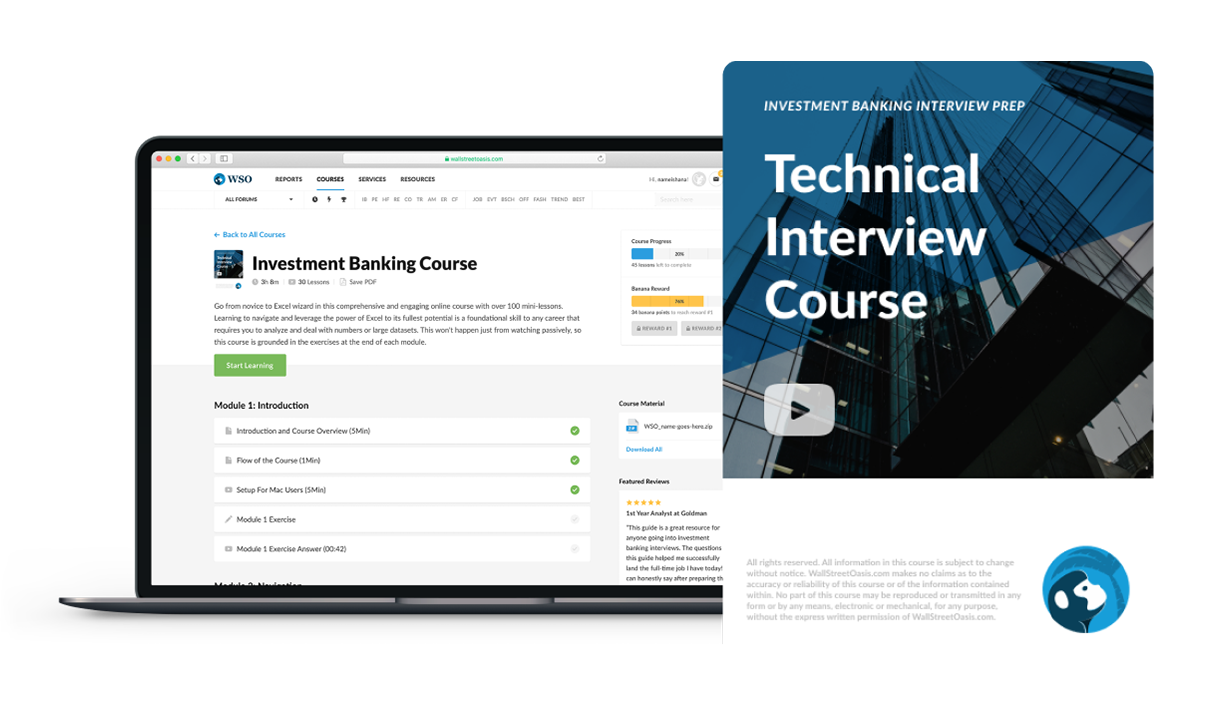
Quantitative Trading Interview Questions
How to Answer the Top Quantitative Trading Interview Question?
Quantitative trading is a highly competitive and fast-paced field involving advanced technology, statistical models, and complex algorithms to create profitable transactions in various financial markets.

The creative and lucrative industry attracts the brightest individuals from multiple academic disciplines, including mathematics, computer science, engineering, and finance.
Being a highly sought-after career, interviewers for quantitative positions are very conscientious in their hiring decisions and look to vet the candidate pool as much as possible.
This is shown in the difficulty of the interviews for positions in this industry. The ideal candidate for a quantitative trading position has proficient analytical skills, program experience, and knowledge of financial markets.
In this article, we will provide some insight into the typical interview process for quantitative trading jobs to prepare you for your next interview in the industry.
Though we may not cover every question asked in these interviews, we suggest checking out the WSO company database for access to peer-provided corporate information, data, and reviews to stay ahead of the competition!
It may also be beneficial to enhance your technique with one of the Wall Street Oasis' wide variety of courses!
These interviews can be broken down into three sections:
- Screening Call
- Technical Interview
- Brain Teasers
- Behavioral Interview
For every step in the interview process, we will tackle all the types of questions that could be asked and create some sample answers to example questions.
We will also provide some general tips and suggestions for how you can ace your next quantitative trading interview and join the elite group of quants!
Screening Call
This is probably the most straightforward part of the quantitative trading interview process. Keep in mind that job postings for positions in quantitative trading receive a high volume of applicants, applications, and resumes.

These applications go through multiple screening software sources before a handful reach the desk of the human resources officer to go through manually. These officers will then choose and select few to reach out to with call availability.
These "screening calls" are short and straightforward. The HR recruiter who reads your resume and application reaches out to the candidate to get a preliminary assessment of the qualifications a candidate has for the specified role.
The HR recruiter can ask various questions ranging from the candidates' background, education, and work experience.
Your HR representative may also ask you some technically inclined questions as part of their assessment. These technical questions are not like the ones asked during the formal interview but may relate to probability theory, statistics, and/or programming languages.
Here are some probable questions and sample answers to help you begin formulating your answers during the interview
Screening Interview Questions and Sample Answers
"Yeah, I received my Bachelor's in Mathematics from WSO University. I took courses in probability theory, statistics, calculus, and linear algebra.
I also have a Master's Degree in Financial Mathematics from OSW University. My master's program focused more on quantitative finance, stochastic calculus, and financial modeling."
"I am fairly proficient in Python & C++. I used both languages in my previous job. More specifically, I used Python to create trading algorithms with signal generation and portfolio optimization and C++ to backtest and simulate trading strategies."
"I keep up-to date-on quant finance news through academic journals, industry conferences, and seminars. I also follow financial news and market trends to be informed and act on emerging opportunities in the market.
In addition, I actively participate in online forums like the Wall Street Oasis and converse with other professionals in the field."
"I took coursework in both and used them in my previous roles to develop risk models for financial institutions and analyze market data to identify patterns and trends. I have also used both in my work on portfolio optimization and simulating portfolio performances."
"I keep up-to date-on quant finance news through academic journals, industry conferences, and seminars. I also follow financial news and market trends to be informed and act on emerging opportunities in the market.
In addition, I actively participate in online forums like the Wall Street Oasis and converse with other professionals in the field."
"Of course! The Black-Scholes model is a formula used to price options based on the price of an asset, the strike price, the time to expire, and the volatility. Stochastic Calculus deals with random processes, similar to stocks or interest rates."
In the quantitative trading industry, it is essential to stay updated on the market and the industry news. You may want to follow market news and scholarly journals to make sure you give up-to-date answers.
These screening calls are an important first step in the hiring process for candidates. This gives them a chance to introduce themselves to the interviewer properly.
Expressing your skills and motivations through thorough preparation can increase your chances of getting a phone call requesting further availability.
Technical Interviews
Congratulations on receiving your interview call. This is a huge step forward in getting that Quantitative Trading Job!

There may be multiple interview rounds for your quantitative trading position, but the questions asked can be sorted into one of three phases. The first of which is the technical interview.
These interviews dive deep into your qualifications and knowledge. The interviewer evaluates your expertise on the topic relevant to the position you are applying for.
Technical Questions and Sample Answers
"Quantitative trading uses mathematical models and algorithms to identify profitable trading opportunities in financial markets. It involves analyzing large amounts of data, developing and testing trading strategies, and using automation to execute trades."
"I would evaluate the performance vs. historical data, its risk-to-reward profile, and market sensitivity. I would also look at the robustness of the strategy, like how it performs in different simulated scenarios and acts with out-of-sample data."
"Alpha is the excess return generated by a trading strategy beyond what can be explained by market factors or beta. Beta, on the other hand, measures the systematic risk of a portfolio or security relative to the overall market.
In other words, beta measures the volatility of a security compared to the broader market, while alpha measures the skill of a portfolio manager or trading strategy in generating returns."
"It requires using algorithms to make trades at high speed and volume. It also uses co-located servers to reduce latency while taking advantage of the market microstructure to profit off of small price movements.
It is normally used by proprietary trading firms and hedge funds to generate profits from small inefficiencies in the market."
"I typically use a wide range of market data in my trading strategies, including historical price data, order book data, news sentiment data, and economic indicators.
I also often use machine learning algorithms to extract features from these data sources, such as identifying patterns or correlations that predict future market movements."
"Risk management is a critical component of any trading strategy, and I typically incorporate risk management techniques such as position sizing, stop-loss orders, and hedging into my trading strategies.
I also regularly monitor the performance of my strategies and adjust the risk parameters as needed to ensure that they remain within acceptable risk limits."
"Market-making involves providing liquidity to the market by buying and selling securities at bid-ask spreads.
Market makers typically profit from the difference between the bid and asking prices rather than directional price movements.
Directional trading takes positions in securities based on future price movement expectations. They profit if the price moves in the direction of their trade."
"Volatility is a measure of the magnitude of price fluctuations of a security or market over a given period. It is often used in trading to estimate the risk of a portfolio or to price options contracts. High volatility means high risk, and vice versa.
Traders may also use volatility as a signal for trading, such as using mean-reversion strategies to profit from periods of high volatility followed by periods of low volatility."
Because quantitative trading encompasses different disciplines, the interviewer can ask a wide variety of questions from mathematics, probability, finance, and programming. Thus, make sure to refresh your memory on these topics before heading into your interview.
Brain Teasers
This next phase of interview questioning is well-known by candidates for quantitative trading positions.

The quantitative trading industry values the ability to think critically, analytically, and creatively very highly. Therefore, these questions are asked to get a sense of the candidate's problem-solving ability and how they handle pressure as they are asked to complete tasks with no warning beforehand.
Brain Teasers Sample Questions and Answers
The answer to this brain teaser is 3.
Here is how you would solve it: first, you weigh 3 balls against 3 others. If the weights are equal, the heaviest ball is one of the remaining 2 balls, so you would weigh them against each other to get the heaviest one.
If the weights from the 3v3 are unequal, you would weigh 2 balls randomly from the heavier 3v3 group to find the heaviest one.
This is a guesstimate question, so your answer could vary. The purpose of this question is to test your ability to make reasonable estimates based on your knowledge and experience.
It would help if you estimated the size and volume of a golf ball and school bus and then consider how you would arrange them and the leftover space.
This question tests the candidate's ability to apply math concepts to a more practical problem. The candidate might want to explain how the value of pi is related to the probability a needle of a certain length will intersect with a series of parallel lines on a piece of paper.
By conducting a series of experiments and measuring the number of intersections, the candidate could estimate the value of pi using statistical methods.
This is a combinatorics problem where the interviewer assesses the candidate's ability to apply principles of counting and probability to solve this problem.
To answer this, the candidate might explain that there are 52 cards in the deck, and the order matters, so there are 52! (52 factorial) ways to arrange a deck of cards.
This number is extremely large (over 8x10^67), so the candidate might also consider approximations or simplifications to the problem, such as dividing by the number of identical permutations (such as swapping two adjacent cards).
As we can see, these questions require creative problem-solving skills and can fluster candidates during their interviews.
There are just a couple of types of brain teasers quantitative trading interviewers like to ask. So while you may know how to solve a couple off the top of your head, be prepared to think critically to answer any brain teaser that pops up.
Behavioral Interview
After going through the last 2 phases of the interview process, your interviewer will evaluate your behavior to ensure that their potential addition to the workplace will help foster a positive and engaging workplace.

They are meant to gauge the candidate's soft skills, such as communication, teamwork, problem-solving, and motivation.
Behavioral Interview Sample Questions and Answers
This question is meant to focus on your problem-solving ability, persistence, and resilience. You would ideally describe the project, the obstacles, and the circumstances surrounding the project.
Please explain the steps you have taken to address, communicate, and resolve the issue clearly, quickly, and efficiently.
This question focuses on the candidate's adaptability and flexibility. The candidate should describe a situation where they were not given structure and how they progressed through that.
The interviewer might ask themselves during your answer: Did the candidate seek additional information? Did they make decisions based on existing data? How did they approach the situation? Your response should be able to answer the questions the interviewer is looking to gain insight on.
We've all heard the saying, "teamwork makes the dream work." This question is designed to evaluate a candidate's teamwork and conflict-resolution skills.
The candidate should explain a situation where they have had a disagreement with a team member and how they approached the decision. If you listened to another perspective, proposed a compromise, or seek mediation, make sure to mention it.
Because quantitative trading is such an intense industry, a candidate should have strong time management and organization skills.
You should explain a situation where you have had to balance multiple priorities and handle unexpected deadlines. You should explain the steps you took to address those priorities and how they helped you.
As you can see, there are many questions asked during the interview process to vet candidates and their qualifications. Therefore, you should be prepared to explain your experience in detail to give your interviewer a good idea of the person they plan to onboard.
Tips & Suggestions
Preparation is key for anyone entering an interview, and quantitative trading interviews are no different. These interviews require the candidate to have a combination of technical knowledge, problem-solving skills, and soft skills.

Here are some tips & suggestions to help you prepare for your next quantitative trading interview:
1. Practice your Math, Statistics & Programming skills
- This industry relies heavily on those disciplines, so having a solid base in them is crucial.
- It would be best if you were comfortable handling complex concepts in probability theory, linear algebra, and most programming languages. You can check out Wall Street Oasis's Python Machine Learning Package to enhance your skills in this area!
2. Understand how financial markets work and quantitative finance concepts
- Quantitative trading uses math and computer science in evaluating financial markets, so you must have a solid understanding of concepts in this industry.
- You should be comfortable explaining financial instruments such as stocks and bonds as well as different financial models like the Black-Scholes Model, CAPM, and Arbitrage Pricing Theory.
3. Practice technical problems
- You should expose yourself to different technical questions related to quantitative trading. These can be found in textbooks or online resources like LeetCode or HackerRank. They will help you be more proficient in problem-solving and coding under time pressure.
4. Practice brain Teasers
- You should familiarize yourself with classic brain teasers to become more familiar with estimation and creative thinking.
5. Develop soft skills
- Being proficient in skills such as communication, teamwork, and conflict resolution can make you more appealing to interviewers.
- You can participate in group projects, clubs/organizations, and community service to gain experience and practice these skills.
6. Research company & role
- You should always be informed on all the latest information regarding the firm you are applying for a role within.
- Understanding the company values, culture, and expectations can help you shape yourself into the ideal candidate for the company and role.
7. Practice interviewing
- You should practice interviewing with friends, family & mentors to be more comfortable in the interview process. You can also participate in a mock interview offered by career centers or online resources like the WSO's mock interview page!
Summary
Quantitative trading is a highly sought-after industry in the field of finance. Jobs in this industry attract talent from various disciplines like mathematics, computer science, finance, and engineering.

As a result, these interviews are very competitive and intense. The interviewer or HR recruiter will ask a wide range of questions to test your qualifications for the job position.
The ideal candidate for positions in this industry has proficient analytical, problem-solving, and critical thinking skills. Therefore, the interviews for this industry can be broken into 2 major parts, and then further into phases.
The first part of the interview process is the screening call. This is a straightforward call made by the HR recruiter to the candidate to get a preliminary assessment of the qualifications a candidate has for the specified role.
After a successful screening call, a chosen candidate will be called into multiple rounds of interviewing, where they will meet and speak with various team members at different positions, ranging from entry-level managers to executive director-level personnel (depending on the role).
These interviews will consist of 3 different types of questions:
1. Technical Questions
These questions are designed to gain an understanding of the candidate's level of understanding of concepts in the industry. They may vary from math to finance to engineering-themed questions.
2. Brain Teasers
These questions seek an understanding of the candidate's ability to solve problems, think critically and creatively, and handle pressure.
These questions can vary greatly but have the same goal of gaining an understanding of how you solve a problem you have never seen before.
These questions aim to understand how you would behave in the workplace. HR recruiters want to hire individuals that will work well with their existing team members.
With the appropriate preparation, candidates can confidently approach quantitative trading interviews and achieve their career goals in this exciting and dynamic field.

Everything You Need To Break into Investment Banking
Sign Up to The Insider's Guide on How to Land the Most Prestigious Jobs on Wall Street.


or Want to Sign up with your social account?